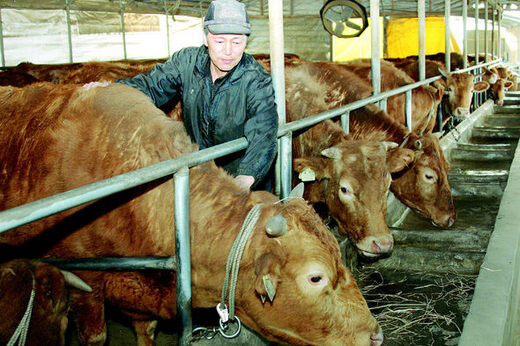hankyoreh
Links to other country sites 다른 나라 사이트 링크
With FTA ink still drying, cow farmers feel change already
With U.S. beef import tariffs to be relaxed, Korean beef farmers watch prices drop

As South Korea agreed with U.S. demands to phase out tariffs on imported beef in a free trade agreement signed earlier this month, local farmers are already feeling the impact on their livelihood even before the trade deal goes into effect.
Sim Seong-gu, a 51-year-old farmer, runs a ranch in Hongseong, South Chungcheong Province, where he grows 120 cows. These days, he hardly smiles. Morning greetings with his neighbors have been replaced by such words as, "What's new now?" as he feels concerned about sharp falling price of cattle and what impact the market opening to U.S. beef will have on his livelihood.
"I have always been worried, but didn't expect it to come so soon," Sim said. "There is no light at the end of the tunnel."
Sim started to raise cows in 1984, when he bought his first heifer. His cows were of high quality, and were healthy enough to remain unafflicted in the midst of the foot-and-mouth disease outbreak which swept the local farming industry in 2000.
Sim's cows were sold at high prices until recently. Last autumn, an 800-kilogram gelded ox was sold for 8.24 million won (US$8,800). A four-month-old female calf was sold for 3.2 million won.
But things turned bad for Sim after South Korea and the U.S. signed the FTA earlier this month, and the price of cattle started to plunge. On April 7, a gelded ox was traded for 8,700 won per kilogram and a female calf was sold for under 2.3 million won.
"Ten years ago, I could get enough money to buy 1,500 pyeong of land if I sold four heifers for 1 million won each. But now I need to sell at least 30 cows to buy the same area of land," Sim said. (One pyeong equals 3.3 square meters.) "Even though the price of land has kept going up since then, the price of cattle has risen relatively little during the same period," he added.
In recent weeks, transactions in local cow markets have come to a virtual halt, even though farmers are putting more cattle on sale, fearing that prices could continue to drop. Regarding a market for cattle around Sim's place, about 500 cows are being put up for sale each day, up from 350 cows on average before the FTA was reached. But only a few are being sold. "Who intends to buy a cow whose price will soon drop further due to anticipated U.S. beef imports?" Sim asked. "The government promised to keep tariffs on imported beef in place even if it signed a free trade deal with the U.S., but they agreed to phase out the barrier over the years. Now I have lost trust in the government," Sim said.
With the gradual elimination of the import tariffs, farmers are concerned that they will not be able to get enough state subsidies, since the duties were mainly used by the government to help farming businesses.
Against this backdrop, some farmers in Honseong are rushing to find a way for survival on their own by streamlining the transaction process through which they intend to raise profitability.
Kim Myung-su, a 54-year-old cattle grower, said, "Through a direct transaction process, consumers can buy good meat at cheaper prices while farmers can make stable earnings," referring to selling beef directly to buyers rather than through suppliers and then supermarkets or butchers.
Please direct questions or comments to [englishhani@hani.co.kr]
Editorial・opinion
![[Editorial] Does Yoon think the Korean public is wrong? [Editorial] Does Yoon think the Korean public is wrong?](https://flexible.img.hani.co.kr/flexible/normal/500/300/imgdb/original/2024/0417/8517133419684774.jpg) [Editorial] Does Yoon think the Korean public is wrong?
[Editorial] Does Yoon think the Korean public is wrong?![[Editorial] As it bolsters its alliance with US, Japan must be accountable for past [Editorial] As it bolsters its alliance with US, Japan must be accountable for past](https://flexible.img.hani.co.kr/flexible/normal/500/300/imgdb/original/2024/0417/6817133413968321.jpg) [Editorial] As it bolsters its alliance with US, Japan must be accountable for past
[Editorial] As it bolsters its alliance with US, Japan must be accountable for past- [Guest essay] Amending the Constitution is Yoon’s key to leaving office in public’s good graces
- [Editorial] 10 years on, lessons of Sewol tragedy must never be forgotten
- [Column] A death blow to Korea’s prosecutor politics
- [Correspondent’s column] The US and the end of Japanese pacifism
- [Guest essay] How Korea turned its trainee doctors into monsters
- [Guest essay] As someone who helped forge Seoul-Moscow ties, their status today troubles me
- [Editorial] Koreans sent a loud and clear message to Yoon
- [Column] In Korea’s midterm elections, it’s time for accountability
Most viewed articles
- 1[Column] The clock is ticking for Korea’s first lady
- 2Samsung barricades office as unionized workers strike for better conditions
- 3[Editorial] When the choice is kids or career, Korea will never overcome birth rate woes
- 4[News analysis] After elections, prosecutorial reform will likely make legislative agenda
- 5S. Korea, Japan reaffirm commitment to strengthening trilateral ties with US
- 6Japan officially says compensation of Korean forced laborers isn’t its responsibility
- 7Why Israel isn’t hitting Iran with immediate retaliation
- 8[Editorial] Does Yoon think the Korean public is wrong?
- 9[Guest essay] How Korea turned its trainee doctors into monsters
- 10[Editorial] As it bolsters its alliance with US, Japan must be accountable for past